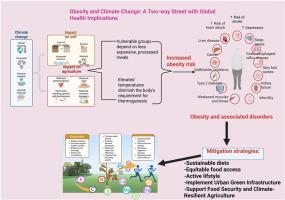肥胖和气候变化:具有全球健康影响的双行道
Q2 Medicine
引用次数: 0
摘要
肥胖和气候变化是21世纪的重大全球挑战,它们对公共卫生、环境可持续性和社会经济公平具有共同的驱动因素和深远的影响。不可持续的粮食体系、城市化和系统性不平等等因素加剧了这两场危机。工业化粮食生产助长了温室气体排放、森林砍伐和资源枯竭,同时促进了高热量、营养不良的饮食,从而加剧了肥胖率。气候导致的粮食不安全进一步加剧了营养不良悖论,营养不足和肥胖并存,对弱势群体造成了不成比例的影响。这篇简短的文章探讨了肥胖与气候变化之间的复杂联系,考察了它们的相互驱动因素、公共卫生影响以及在粮食系统中的作用。这种交流的新颖之处在于它融合了新兴的、未被充分探索的双向机制,包括温度调节效应和不同的排放贡献,并得到了最近证据的支持。本文旨在提供一个简洁但与政策相关的观点,强调被忽视的联系和可行的解决方案,而不是作为一份全面的综述。通过明确构建这篇简短信息的范围和贡献,我们的目标是将我们的工作与更广泛的文献综述区分开来,并强调其与综合卫生-环境政策制定的相关性。建议包括利用技术、促进全球合作和推进跨学科研究,以全面解决这些交叉的危机。与公共卫生和环境目标保持一致,对于为人类和地球的福祉创造一个有复原力和公平的未来至关重要。这个简短的交流是通过对学术文章、政策报告和案例研究的广泛审查而形成的,这些研究涉及肥胖和气候变化的交叉点。通过PubMed、Scopus和谷歌Scholar等数据库确定来源,关键词包括“肥胖”、“气候变化”、“食品系统”和“公共卫生政策”。分析的重点是确定共同的驱动因素、相互影响和可操作的策略。会议强调了基于证据的见解和多学科方法,以提出解决这两个危机的综合解决方案。本文章由计算机程序翻译,如有差异,请以英文原文为准。

Obesity and Climate Change: A Two-way Street with Global Health Implications
Obesity and climate change are critical global challenges of the 21st century, with shared drivers and far-reaching impacts on public health, environmental sustainability, and socioeconomic equity. Both crises are fueled by factors such as unsustainable food systems, urbanization, and systemic inequities. Industrialized food production contributes to greenhouse gas emissions, deforestation, and resource depletion while promoting calorie-dense, nutrient-poor diets that exacerbate obesity rates. Climate-induced food insecurity further intensifies the malnutrition paradox, where undernutrition and obesity coexist, disproportionately affecting vulnerable populations. This short communication explores the complex connections between obesity and climate change, examining their mutual drivers, public health implications, and role in food systems. The novelty of this communication lies in its amalgamation of emerging, underexplored bidirectional mechanisms, including thermoregulatory effects and differential emissions contributions, supported by recent evidence. Rather than serving as a comprehensive review, this paper aims to offer a concise yet policy-relevant perspective that emphasizes overlooked linkages and actionable solutions. By clearly framing the scope and contribution of this short communication, we aim to distinguish our work from broader literature reviews and highlight its relevance for integrated health-environment policy development. Recommendations include leveraging technology, fostering global collaboration, and advancing interdisciplinary research to address these intersecting crises holistically. Aligning with public health and environmental goals is essential for creating a resilient and equitable future for both human and planetary well-being. This short communication was developed through an extensive review of scholarly articles, policy reports, and case studies addressing the intersections of obesity and climate change. Sources were identified via databases such as PubMed, Scopus, and Google Scholar, with keywords including “obesity,” “climate change,” “food systems,” and “public health policies.” The analysis focused on identifying shared drivers, mutual impacts, and actionable strategies. Emphasis was placed on evidence-based insights and multidisciplinary approaches to propose integrated solutions that address both crises.
求助全文
通过发布文献求助,成功后即可免费获取论文全文。
去求助
来源期刊

Obesity Medicine
Medicine-Public Health, Environmental and Occupational Health
CiteScore
5.50
自引率
0.00%
发文量
74
审稿时长
40 days
期刊介绍:
The official journal of the Shanghai Diabetes Institute Obesity is a disease of increasing global prevalence with serious effects on both the individual and society. Obesity Medicine focusses on health and disease, relating to the very broad spectrum of research in and impacting on humans. It is an interdisciplinary journal that addresses mechanisms of disease, epidemiology and co-morbidities. Obesity Medicine encompasses medical, societal, socioeconomic as well as preventive aspects of obesity and is aimed at researchers, practitioners and educators alike.
 求助内容:
求助内容: 应助结果提醒方式:
应助结果提醒方式:


